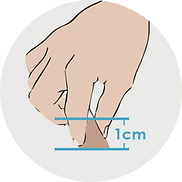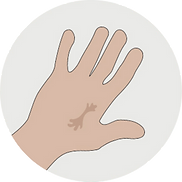Disclaimer: The information provided on this website is for educational purposes and self-guided study only. All recordings, online classes, media files, pages, blog posts, and documents of any kind available from this website are not intended to be a substitute for professional help or medical treatment. Nothing on this website is intended to diagnose or treat any pathology, disease or injury of any kind. This website, the creator of any and all of these files, and anyone featured on these files, cannot be held responsible for any injuries or discomfort that might arise while following this methodology. If you have any doubts about whether any of this information is appropriate for you, be sure to consult your medical practitioner.
How to Hydrate Yourself to Wellness
It is estimated the human body is composed of 75-90% water. All of our biochemical processes require large amounts of water. Proper hydration optimizes all biological processes. Anyone who has experience with wilderness recreation and/or rescue techniques will tell you that proper hydration is the key to survival in the extremes—so much so that people lost in the wilderness survive 8-10 times longer if they remain properly hydrated. Water clears your thinking, soothes muscle aches, and fortifies your ability to fight infections and heal injuries. With consistent use, good-quality water keeps your organs and all of your vital systems cleaner and working better. Here are some of the primary ways in which you can keep yourself well hydrated on a day-to-day basis.
Filter Your Water
It is extremely beneficial to drink good quality spring water or water that has been filtered using zinc-copper ion exchange and carbon filters. These types of filters leave minerals in water which balance the water within our cells. This increases the efficiency of our biochemical processes. Filtered water makes a difference in drinking as well as cooking. For a guide to quality water, click below.

Pay Attention to Your Skin
Unhealthy skin is not necessarily a sign of chronic dehydration. Dry, flaky skin which is prone to rashes and cracking may be signs of
-
low intake of foods that provide essential fatty acids
-
improper water filtration, causing ingestion of too many dissolved minerals
-
poor digestion, which limits ability to break down fats and provide the essential fatty acids needed to repair skin (and other membranes that require those fats as well).
The Hydration Pinch Test
True dehydration in the skin shows up as tenting when the skin on the back of the forearm is gently pinched and lifted and doesn’t immediately flatten back to normal, but remains in a “tented” shape as soon as you release the skin. This is also a sign of the loss of skin tone due to aging so is not always a true sign of dehydration.

Lightly pinch some skin on the back of your hand.

Pull it up about one centimeter before letting it go

If you’re dehydrated, the skin will spring back into its regular position almost immediately.
Pay Attention to Your Urine
If your urine is dark in color and small in amount after a significant time span since your last urination, this is a sign that you are dehydrated. Fruits, fruit juices, and sports drinks are a better way of hydrating yourself when you are in this state than straight water. The vitamins and minerals in their composition balance the body and facilitate water absorption quickly, instead of just causing you to urinate.

Wear a Hat
We lose most of our water and through the tops of our heads both in cold and hot weather. In the winter, you need less water to keep your body temperature stable and you lose less water through your head if you wear a hat. In the summer, a cool, cotton hat will protect you from heat exhaustion and help you re-circulate the water in your body. By preserving the water already in your body, you need to drink and eat less to keep it functioning optimally.




Eat Whole Foods
Whole foods are balanced in their proportions of nutrients, fibers and water, meaning they contain the right amount of water needed to digest them. A whole food is one which has not been altered from its natural state. For example, an orange contains all of its nutrients, but orange juice has had essential fibers removed; an egg is more balanced than egg whites or egg yolks alone; whole wheat contains all components of the wheat grain except the hard outer shell of the grain, while white flour has removed fibers and minerals and added preservatives.


Shop for whole foods, those with very few, simple ingredients.
Additives like preservatives and artificial sweeteners are difficult for our digestive systems to process.
Surround Yourself With Plants
Keep plants in the places where you work and sleep and/or spend most of your indoor time. Plants regulate the levels of water vapor in the air. They evaporate their water if there is too much in their soil and/or on their leaves, and they absorb it from the air if it is very steamy. When you water your plants, you are actually watering yourself too.

Philodendron
Pothos
Peace Lily
Snake Plant
Jade Plant
Dracaena
Limit or Eliminate Caffeine, Sugar, & Alcohol
Coffee, highly caffeinated drinks, sodas,* candy, and alcohol are dehydrating.
*Ginger ale, Dr. Pepper and root beer can be used in small quantities as digestive aids, as they contain ginger, prunes, and sarsaparilla respectively. This can have a net hydrating effect when the digestive system is not breaking food down well.


Bathe
When you are extremely dehydrated or too hot or too cold, swim, bathe or shower. When you bathe or shower, you are able to hydrate by inhaling the water which is evaporating around you. Inhaling water vapor can balance the water in our bodies faster than drinking because of the lungs’ ability to transport water. The rapid cooling and warming capacity of baths increases your body’s ability to balance the water at the cellular level, so when you are very dehydrated bathing and showering is a faster way to hydrate yourself than just drinking water.
.png)